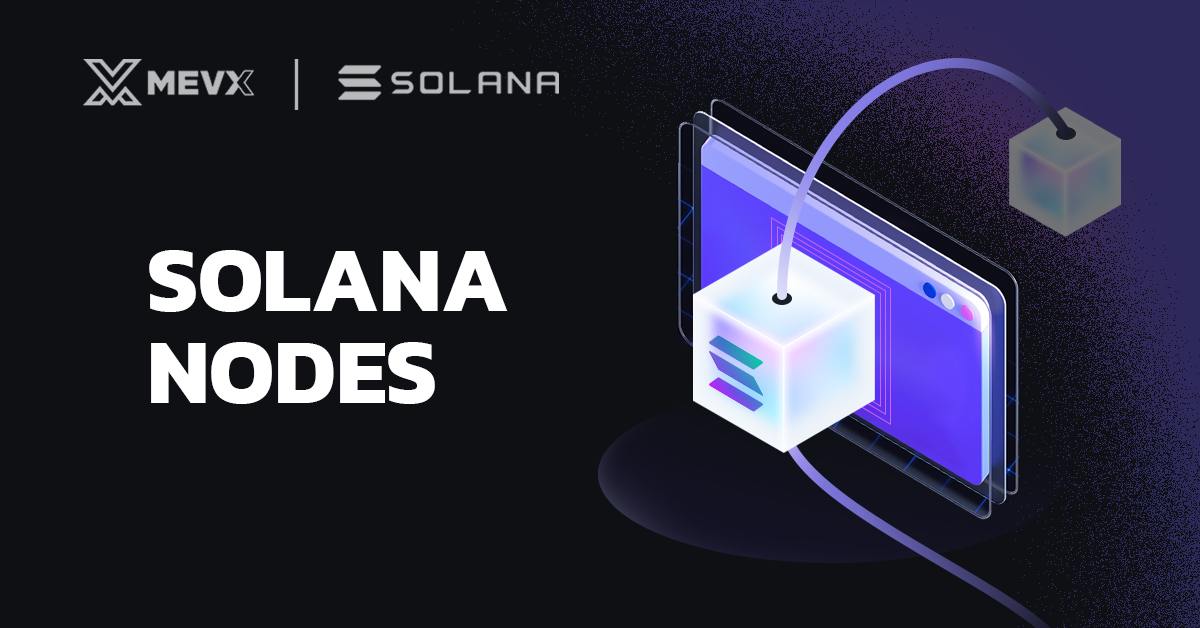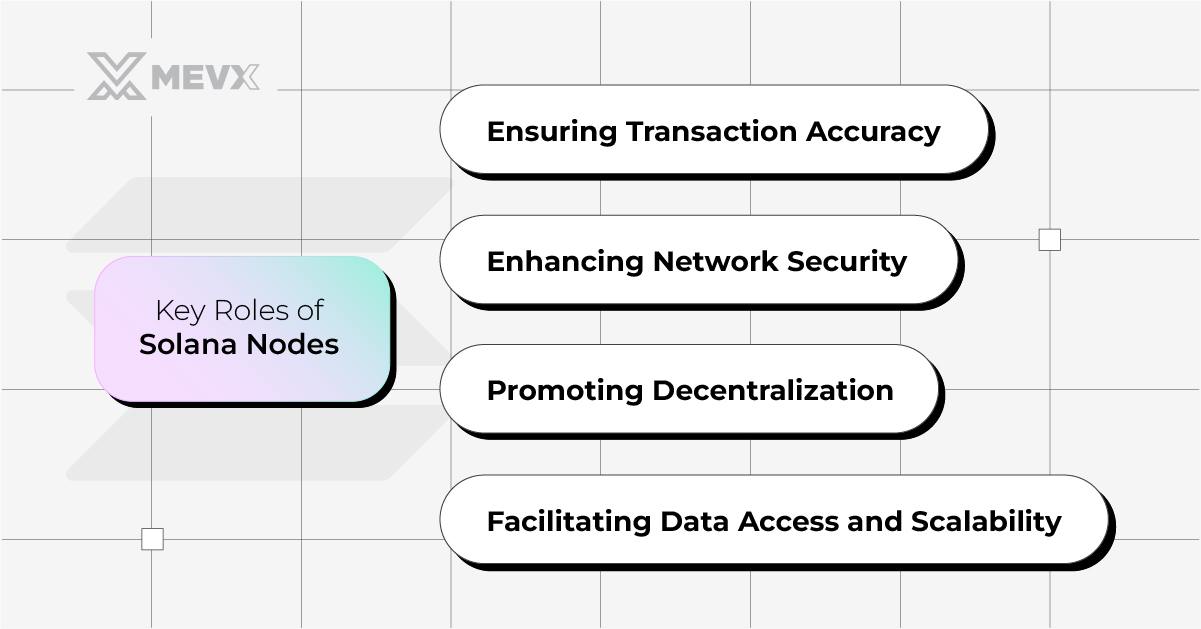It is apt to mention that any blockchain will always have nodes, and these nodes form the lifeline of the network that maintains the functionality, security, and decentralization of the network. Solana, acclaimed for its ultra-fast and scalable blockchain infrastructure, uses its robust node architecture as the backbone to keep these exceptional capabilities running.
This article will take a deep dive into the very core elements of Solana nodes: their purposes, types, advantages, and where they would fit into the larger scheme of blockchain.

Solana Nodes
What Are Solana Nodes?
A Solana node is an active computer participant in the Solana blockchain network, used for transaction validation, maintenance of network integrity, and system security. Solana introduces a novel hybrid consensus model that effectively combines Proof of History (PoH) and Proof of Stake (PoS) to support high-speed, low-latency transactions.
The network’s distributed architecture ensures that the computational load is shared across numerous nodes rather than centralized, fostering further decentralization and resilience within the network.
Types of Solana Nodes
Solana’s network relies on two primary kinds of nodes: Validator Nodes and RPC Nodes. Both have a different yet significant role in ensuring the efficiency, accessibility, and decentralization of the blockchain.
Validator Nodes: The Backbone of Transaction Validation
Validator nodes are responsible for validating and verifying transactions in the Solana ecosystem. They ensure that only legitimate transactions are added to the blockchain, maintaining the network’s integrity. Validators stake Solana’s native cryptocurrency, SOL, to participate in the block validation process. This kind of staking mechanism creates strong incentives for honest behavior due to the slashing process, a partial loss of stake by validators for malicious actions.
Validators are incentivized with SOL tokens to perform the validation, making them a very lucrative option for individuals or organizations that require technical expertise and resources. Besides financial addition, validator nodes make the network much more decentralized. The more validator nodes a network has, the stronger and more resilient it will be to attack vectors or censorship. Setting up a validator node requires highly performant hardware and advanced knowledge of blockchain operations to ensure optimal performance.
RPC Nodes: The Gateway for Developers and dApps
RPC (Remote Procedure Call) nodes serve as the bridge between developers, applications, and the Solana blockchain. They are necessary for external entities, including decentralized applications (dApps) and users to interact with the blockchain easily. These nodes process a variety of requests, such as retrieving data, querying account balances, sending transactions, and more.
For developers, RPC nodes are indispensable. They abstract the requirement of running a full validator node and allow much easier access to the building on Solana. RPC nodes also will have to ensure applications can function well because they will have to process an enormous volume of queries and requests in real time. Equipped with this capability for abstracting blockchain interaction, RPC nodes represent a crucial component in driving innovation and scalability in the Solana ecosystem.
Key Roles of Solana Nodes
Solana nodes play a pivotal role in maintaining the blockchain’s functionality, security, and scalability. Let’s explore their contributions below:

Key Roles of Solana Nodes
1. Ensuring Transaction Accuracy
The validator nodes in Solana inspect and timestamp transactions with the help of its special mechanism known as Proof of History. In this system, transaction processing is allowed serially, without the need for constant node-to-node communication. The result is very fast transaction validation; it enables Solana to boast of thousands of transactions being transacted per second.
2. Enhancing Network Security
Solana nodes act as guardians of the blockchain. Validators adhere to a Proof of Stake consensus where they stake SOL tokens to validate blocks and secure the network. This can be both an incentive, a reward, and a deterrent against potential malicious behavior, as nodes will be slashed in case of fraudulent behavior, ensuring honest participation in the network.
3. Promoting Decentralization
This is highly dependent on the broad distribution of nodes in the network. The more nodes there are, the stronger, more resilient, and more resistant to attacks and failures the blockchain becomes. It’s a core decentralization that is considered one of the cornerstones of blockchain technology and ensures no single entity can dominate or compromise the network.
4. Facilitating Data Access and Scalability
RPC nodes simplify access to the blockchain by processing user and developer requests efficiently. They serve as a reliable interface for retrieving data and enabling interactions with Solana’s ecosystem. This functionality is vital for developers creating scalable, high-performance dApps and other blockchain-based solutions.
Why Run a Solana Node?
Operating a Solana node comes with financial rewards, it also contributes to making the network safer, boosts application performance, and gives full autonomy over blockchain interactions.
1. Earn Rewards and Financial Benefits
The privilege of running a validator node means that participants are allowed to earn SOL tokens as rewards for their contribution to transaction validation. These rewards can be a lucrative incentive for those people and businesses that have the resources to operate a node.
2. Contribute to the Network’s Growth
The operators of nodes are contributory elements to the security and further decentralization of Solana. Running a node means contributing to a resilient network, which would be resistant to attacks or node failures.
3. Enhance Application Performance
Developers benefit by improving the performance of their DApps as a result of the running of a dedicated RPC node. Reduce latency, which means faster transaction processing, thereby creating better developer experiences critical for DApps requiring real-time data or high-frequency transactions.
4. Gain Full Control and Autonomy
Operating your own Solana node gives you full control over how the interactions with the blockchain are performed. This applies greatly to organizations that require security, compliance, or customization for blockchain operations. You ensure transparency and reliability in handling your blockchain data using a self-operated node.
Requirements for Running a Solana Node
The operation of a Solana node involves complex hardware and extensive technical knowledge in validator and RPC nodes. Their minimum specifications include the following:
- CPU: Minimum 12-core processors (e.g., AMD Ryzen 9 or Intel Xeon).
- RAM: 128 GB or higher.
- Storage: NVMe SSD with at least 500 GB capacity.
- Internet Connection: High-speed internet with 1 Gbps upload.
Validator nodes need a lot more staked SOL tokens to keep technical proficiencies in blockchain system maintenance.
How to Pick the Perfect RPC Provider?
Selecting the right RPC provider is critical for developers and teams looking to optimize their interaction with the Solana blockchain. The key aspects of such a selection are given below:
1. Performance and Scalability
Choose a reliable infrastructure that can serve many API requests with the least latency. That means application performance will be smooth and fast even during loads of work.
2. Reliability and Uptime
Provider needs to ensure uptime and reliable services. dApps need seamless access to the blockchain for smooth execution.
3. Cost-Effectiveness
Compare the pricing models against each other and find reasonable cost-effectiveness. Get transparent pricing with options to suit your project scale and budget.
4. Security Features
Security is paramount in dealing with any blockchain. Find a provider with robust security measures, like encryption and DDoS protection, to protect your data and transactions.
5. Developer Tools and Support
Some providers offer additional features, such as developer dashboards, analytics, and customer support. These can be invaluable for troubleshooting and optimizing your application.
6. Scalability for Growth
Consider scalability by the service provider, growing with your application. Choose a service that offers flexible plans and infrastructure that scales with increasing demands.
Conclusion
Solana nodes are the backbone of this high-speed, scalable infrastructure. Learning about the roles they perform, the types of nodes, and their benefits will convert you into an active contributor to this advanced blockchain ecosystem. Whether running a node or leveraging an RPC provider, the might of the Solana nodes shapes this blockchain technology to become the future. There is much to consider by developers and businesses when choosing the right RPC provider for efficient, secure, and scalable interactions with the Solana blockchain.
Share on Social Media:
